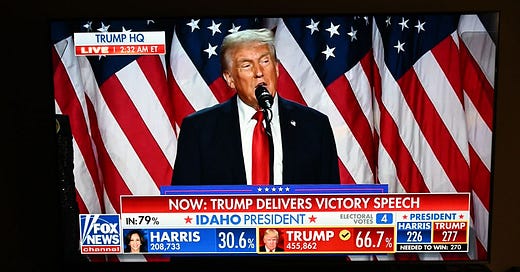Ruth Ben-Ghiat on resistance versus resilience
We resume our conversation with the historian. This time, we talk about Democrats in opposition, the long game of politics, and building community to fight for a better world
Continuing the conversations we’ve been having with leading writers and thinkers about how the results of the 2024 election have upended expectations about American politics and forced a reevaluation of progressive strategy, we talked with historian of fascism Ruth Ben-Ghiat, whose analysis of authoritarianism has helped shape our thinking about Trump and the MAGA movement over the past eight years.
In the second part of our interview, we talk with Ruth Ben-Ghiat about what Democratic opposition to the Trump regime might look like, the difference between resistance and resilience, the failure of media, what labor’s role might look like going forward, and whether the groundswell of support for the Harris-Walz campaign has the potential to grow into the pro-democracy movement the United States needs in the coming years.
To read the first part of this conversation, visit the link below:
We hope The Ink will be essential to the thinking and reimagining and reckoning and doing that all lie ahead. We want to thank you for being a part of what we are and what we do, and we promise you that this community is going to find every way possible to be there for you in the times that lie ahead and be there for this country and for what it can be still.
So what does Democratic Party opposition to Trumpism look like? Governor Pritzker has started this Governors Safeguarding Democracy group. But some significant Democratic leaders have not signed on to that. Whitmer, for instance, is not going to participate. Others have already indicated that they want to work with the Trump administration, And Kamala Harris and Tim Walz have not emerged as visible opposition figures. You don't see the Democrats immediately stepping into the role of an opposition party rhetorically now in the way that you might see in a parliamentary system immediately after an electoral loss.
There's a vacuum still, and you can feel that. It seems like a real political problem. I don't know if you see it that way or if it's just the nature of American politics. But as Anand has said, maybe the role of the party really does have to change, and the DNC chair going forward should be someone who can really motivate people. Do you see it that way?
I agree. It’s been dispiriting to people that Harris and Wallace were such strong and exciting figures and didn't have enough time in some ways to build their case fully or to course-correct. That was just built into the nature of this campaign.
But since the defeat, they've been more silent. And you're right that Pritzker and other people who have immediately stepped up in a very courageous manner – saying they're going to have to go through me to do these unlawful, indecent things like mass rounding up you know undocumented people – haven't been met with resounding solidarity.
So that has indeed, as you say, created a bit of a vacuum. Now, it's still early after the election, and it doesn't mean that we're not going to hear from them again. Each day seems like 10 days right now. And this is a time for reflection, and I'm not defending their silence, but we in America want instant reactions, instant solutions.
And as I've been writing in Lucid, that's not going to be the most fruitful. Everybody is burned out and not in the best shape. And it doesn't mean we're not going to hear from the Democrats in the future. That said, there is indeed a problem of growing distance between the elite democratic machine and voters.
And this was encapsulated in the issue of Biden’s age.
Yes, and so, yes, some kind of flexibility, some kind of innovation within the party in terms of leadership. Spokespeople are very important nowadays. Who are the faces you're putting out there? And what are they saying? What language are they speaking? That's another thing about this. We have to reevaluate how we're communicating, where we're communicating, who is our audience.
And it's not just within the party. How do we reach these tens of millions of people who don't vote now? I'm very preoccupied with this. How do we get to them?
We had talked about this back in January. How do you make the case to get back constituencies the Democratic Party is losing, people who voted Democrat and now are voting, many would say, against their interests in general?
Keep reading with a 7-day free trial
Subscribe to The.Ink to keep reading this post and get 7 days of free access to the full post archives.






